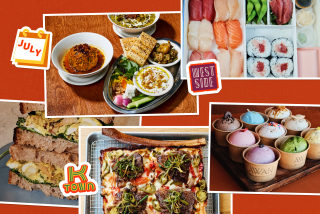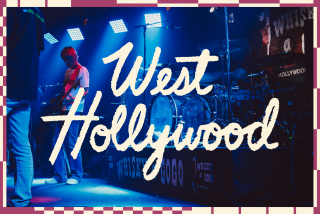Door-to-door liquor delivery helps small stores survive
Mary Michaels keeps a bucket of treats under the counter for people who come in with dogs. She greets customers by first name. A woman walks in the front door just to tell Michaels that she’s having a second baby.
Michaels owns Almor Wine & Spirits on Sunset Boulevard, a high-end liquor store that her parents opened in 1955. It was in the middle of the booming 1950s, the year that Disneyland opened in Anaheim. Long before the days of BevMo and Costco, Michaels’ mother handwrote the store’s name and address on hundreds of cards and distributed them around the neighborhood.
FOR THE RECORD:
Liquor delivery: In the Dec. 27 Business section, an article about door-to-door liquor delivery in the Hollywood area misspelled the last name of Almor Wine & Spirits owner Mary Michiels as Michaels.
Today, competition from big-box and discount stores is stiff, but Michaels brings something potent to the table: instant gratification.
Decades ago, Hollywood’s lavish parties created a demand for businesses that quickly delivered alcohol. And now, this relic of Hollywood’s past is giving small liquor stores like Almor an edge in a market inundated with other ways to buy booze.
Although Southern California is dotted with stores that deliver alcohol to homes and businesses, the concentration is particularly high in and around Tinseltown. Within a 3-mile radius of the Hollywood & Highland Center are at least 10 stores that offer door-to-door alcohol delivery.
“Delivery is part of this area’s tradition,” said Danny Setareh, co-owner of Gil Turner’s Fine Wines & Spirits in West Hollywood, which has been delivering for more than 50 years. “Everybody is happier with that, so why shouldn’t we do it?”
In the late 1960s and early 1970s, nearby Laurel Canyon became known as home to musicians including Jim Morrison and Joni Mitchell. The narrow, winding roads leading in and out of the canyon made delivery a vital service, said Kerry Gogan, a record producer who grew up in the neighborhood during that time.
“It was kind of a discreet way to take care of your business without people knowing your business,” said Gogan, whose family used alcohol delivery about once a week when she was a kid.
Today, as corporate and franchise businesses in things as varied as auto parts and yardage stores beat out mom-and-pop operations, Hollywood liquor merchants are keeping their customers with their ability to satisfy immediate urges.
“When you’re shopping for liquor online, you want to get a drink,” said Michael Crumrine, who lives in Laurel Canyon and gets alcohol delivered from Almor and the Laurel Canyon Country Store.
California is one of 18 states where the delivery of beer, wine and liquor is allowed with no restrictions. Nine states prohibit such deliveries. Even in New York, known for bringing almost anything to your doorstep, delivery of alcohol is restricted by quantity, and the delivery truck must be clearly marked.
In the Hollywood area, stores such as Almor, Bogie’s Liquor and Mel & Rose report that they make about 30 deliveries a day.
The demand is so high that one liquor store has been transformed into a large-scale delivery service that employs 25 full-time employees. They drive a fleet of pink VW bugs making deliveries in 30 minutes. Although the company, Pink Dot, delivers prepared hot foods and groceries in addition to alcohol, owner Sol Yamini said its bestsellers are liquor, cigarettes and condoms.
Yamini said he plans to expand Pink Dot to downtown L.A., the San Fernando Valley, downtown San Diego and San Francisco over the next three years. Although he hopes all four locations will be successful, he said the West Hollywood spot will probably always be the busiest because of the culture there.
“You live in West Hollywood if you want to be in that Hollywood lifestyle — go to the bars the Kardashians go to, the guys from [the HBO series] ‘Entourage’ go to,” he said. “People that live in WeHo live in WeHo because they like to go out, and going out goes hand in hand with drinking.”
Will Salao, a district administrator with the Department of Alcoholic Beverage Control, said there’s no way to know how many liquor stores offer delivery because no special license is needed besides the liquor license for the business.
But delivery can create complications for liquor store operators. If a liquor retailer allows a customer to pay for the products when they are delivered rather than online or at the store, Salao said, the business is violating its liquor license, which is restricted to sales at the address of the business with the license.
“Let’s say you’re a delivery guy for a store and you have a beer, a 12-pack, and you go up to the door and sell the beer, you could be arrested for that,” Salao said.
Representatives of several stores offering liquor delivery told The Times that they allow their customers to pay at the door.
Salao said the department doesn’t take action against businesses unless there’s a complaint.
With delivery and Internet sales, there’s also fear of underage drinking.
A delivery person has little incentive to refuse to turn over alcohol if the customer is under 21, said Jim Mosher, senior policy advisor for CDM Group, a healthcare consulting company that works with the Substance Abuse and Mental Health Services Administration on programs to prevent underage drinking.
“If you want to have an underage drinking party, well, that’s the way to do it,” Mosher said.
In one study conducted last year, underage drinkers could buy alcohol online in 45% of attempts.
At Hollywood-area liquor stores, operators insist that they check IDs and don’t deliver to people under 21.
Yamini acknowledged that teenagers could theoretically try to order alcohol from Pink Dot. But he said his store hasn’t had any problems with underage buyers because everything stays legal “as long as you check ID” — which his employees are trained to do. Other retailers echoed his comments.
For small stores, offering alcohol delivery is still an appealing way to attract and retain customers despite the possible pitfalls.
Scott Teruya opened Silverlake Liquor three years ago as the economy was struggling to recover from the recession. He said delivery is a vital part of the customer service that has helped his business pick up since.
“It’s a good time to be in this business,” he said. “I can’t complain.”
soumya.karlamangla@latimes.com
Twitter: @skarlamangla
More to Read
Inside the business of entertainment
The Wide Shot brings you news, analysis and insights on everything from streaming wars to production — and what it all means for the future.
You may occasionally receive promotional content from the Los Angeles Times.











